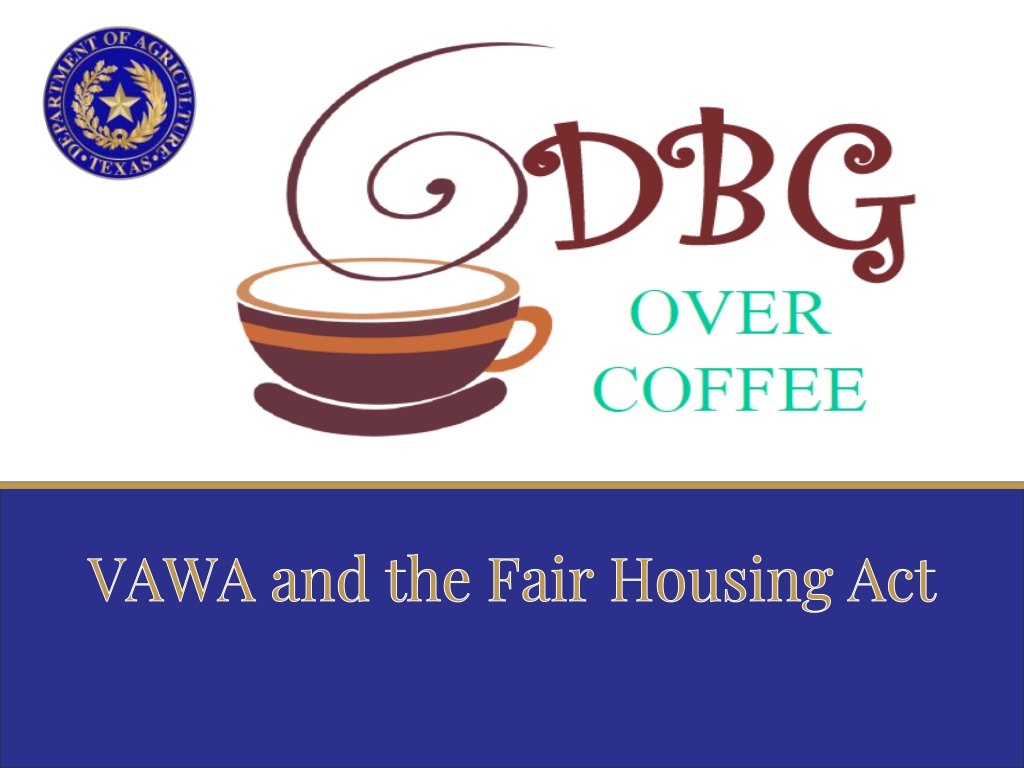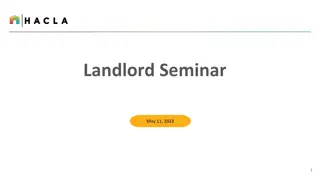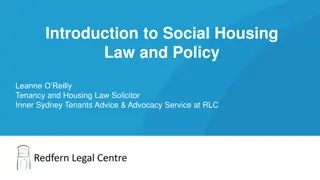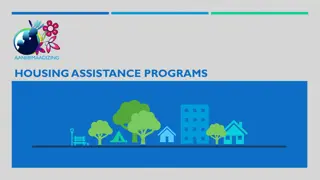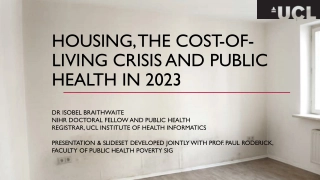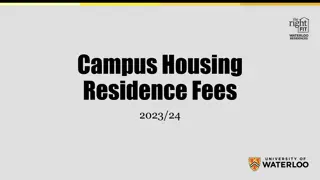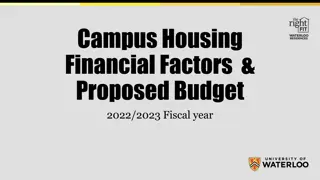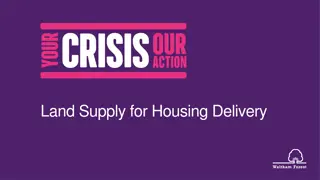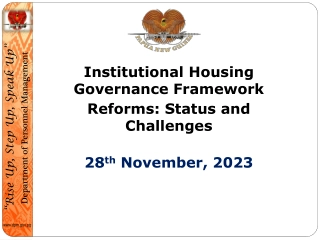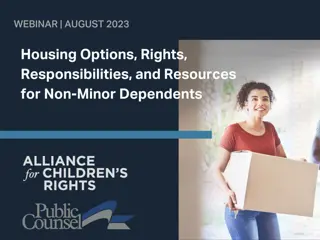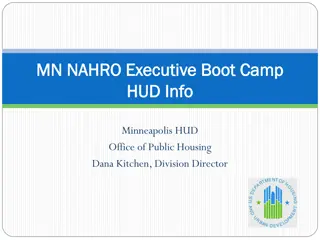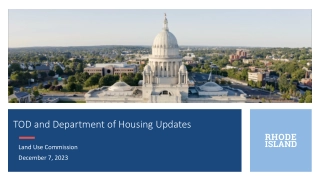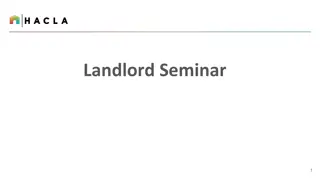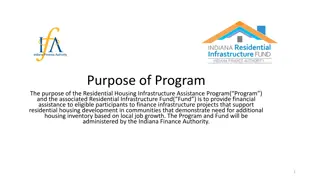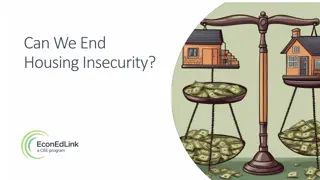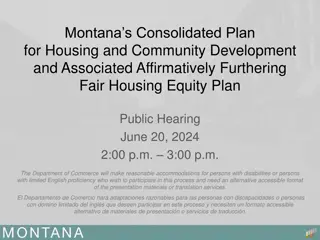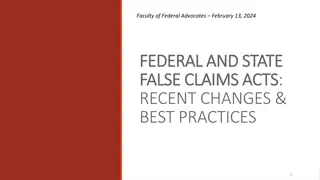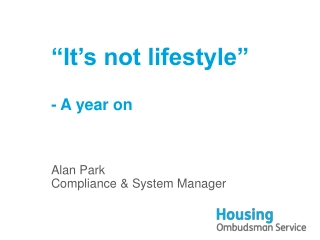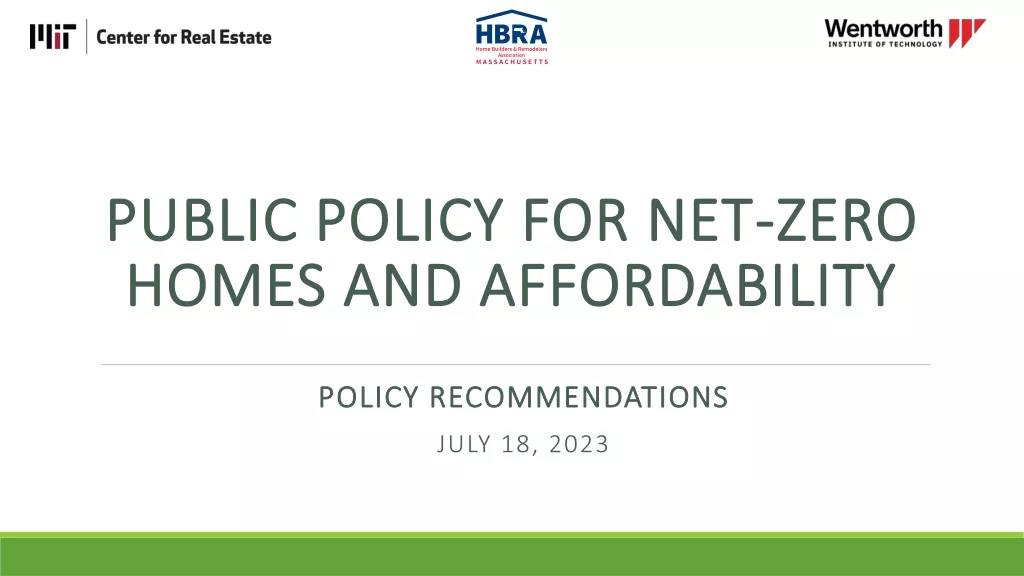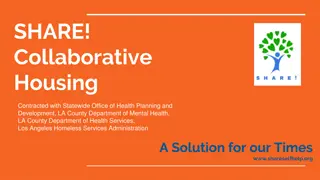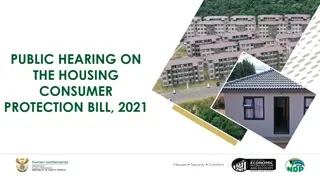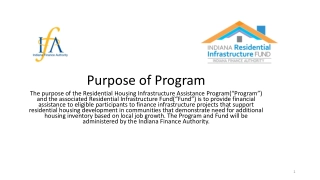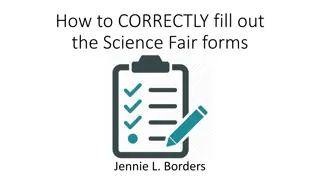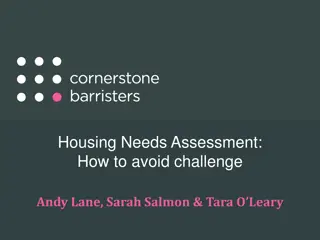Understanding VAWA and the Fair Housing Act
The Violence Against Women Act (VAWA) was passed in 1994 to provide funding for investigating and prosecuting violent crimes against women, establish housing protections for survivors of domestic violence, and more. The act has been reauthorized multiple times, most recently in 2022, with new provisions to enforce housing protections and the right to report crimes and emergencies. Recipients of Community Development Block Grants (CDBG) are required to comply with VAWA regulations, including reporting on laws and policies related to penalties for seeking law enforcement or emergency assistance. The reauthorization emphasizes the right of tenants to seek assistance without fear of penalties.
Download Presentation
Please find below an Image/Link to download the presentation.
The content on the website is provided AS IS for your information and personal use only. It may not be sold, licensed, or shared on other websites without obtaining consent from the author. Download presentation by click this link. If you encounter any issues during the download, it is possible that the publisher has removed the file from their server.
Presentation Transcript
What is VAWA? Congress passed the Violence Against Women Act in 1994. Provided funding for investigation and prosecution of violent crimes against women. Established Office on Violence Against Women which administers the law and allocates grants. Enacted new offenses and penalties for abusers who cross state lines in the commission of crimes against women, including stalking. Provided housing protections for survivors of domestic violence, dating violence, sexual assault, and/or stalking.
What is VAWA? This comprehensive legislative package: Improves criminal justice responses to sexual assault, domestic violence, dating violence, and stalking Increases availability of services for victims and survivors Provides survivors of violence and protected classes with housing protections for the first time Prohibits retaliation against survivors for exercising their VAWA right Provides new enforcement authorities for HUD and DOJ Applies to HUD & CDBG-covered housing programs.
CDBG Requirements The VAWA law requires CDBG recipients to Report on the existence of laws or policies that they or their subgrantees (or state grant recipients) adopted that impose penalties on requests for law enforcement or emergency assistance or based on criminal activity that occurred at a covered property. Certify that they and their subgrantees are in compliance or describe the steps that they and their subgrantees must take to comply within 180 days of the report to HUD.
Reauthorization of VAWA Congress reauthorized VAWA in 2000, 2005, 2012, 2019, and 2022. The 2022 reauthorization: requires HUD to implement and enforce VAWA housing provisions. Added the right to report crimes and emergencies from one s home, including HUD-assisted housing.
Reauthorization: Right to Report Tenants, residents, occupants and guests have the right to seek law enforcement or emergency assistance on their own behalf or on another person in need. May not be penalized on their requests for assistance or based on criminal activity when they are a victim. It is unlawful to threaten or subject individuals seeking assistance to monetary or criminal penalties, fines, fees, or eviction.
Reauthorization: New Requirements A new requirement for HUD grantees and their subrecipients to support an individual s, including survivors, right to seek law enforcement or emergency assistance. CDBG recipients will have additional requirements to report non- compliant local laws and ordinances. HUD is reviewing the meaning of these new requirements and protections for HUD grantees and their subrecipients. HUD is reviewing the planning and analysis costs associated with CDBG implementation that may be allowable or unallowable. HUD will issue further guidance CDBG recipients may find it advisable to immediately identify and remedy laws and policies that may be non-compliant.
AFFH and VAWA Affirmatively Further Fair Housing (AFFH) The Fair Housing Act prohibits discrimination in housing choice and opportunity on the basis of seven protected classes: Race Color Religion National Origin Sex Disability Familial Status In addition, the Act and the U.S. Department of Housing and Urban Development (HUD) require recipients of assistance to take meaningful action to overcome discrimination and barriers to fair housing choice. Recipients of CDBG assistance must certify that they will affirmatively further fair housing.
Assessing Ordinances as Part of AFFH In conducting assessments of fair housing, local governments should assess their nuisance and/or crime- free housing ordinances. Review how nuisance ordinance and crime-free housing ordinances are enforced. Consider how these ordinances affect access to housing and access to police, medical and other services based on sex, race, national origin, disability, and other protected classes. Local governments should consider repealing or amending nuisance and crime-free ordinances that require or encourage evictions for use of emergency services by domestic violence or other crime victims.
What are Nuisance Ordinances? Nuisance Ordinance - Local codes which label various types of conduct associated with a property as a nuisance, such as: Disorderly conduct Disturbing the peace or excessive noise Criminal conduct occurring on or near the property May be defined by an excessive number of calls for emergency police or ambulance services Ordinances generally require housing providers either abate the alleged nuisance, risk fines, or loss of rental permits.
What are Crime-Free Housing Ordinances? Crime-Free Housing/Lease Ordinances May penalize housing providers who fail to evict tenants, including crime victims, when a tenant or other person has engaged in a law violation. May mandate housing providers to include lease provisions that require or permit eviction of tenants for a single incident of criminal activity.
Summary of Discriminatory Local Laws and Actions Nuisance property ordinances that include fines for excessive calls for emergency or ambulance services and/or incidents of domestic violence. Laws that lack exceptions for where the resident or tenant is a survivor of domestic violence or another crime, or for calls for emergency assistance by persons with disabilities. Laws that do not specify domestic violence as a nuisance but still penalize survivors due to having a broad definition of nuisance activities (e.g., disturbing the peace, excessive noise, disorderly conduct, or excessive calls to emergency services). Laws that require or encourage denial of an applicant with any criminal record, including arrests or misdemeanors.
Nuisance Conduct Example Veronica moved into a new apartment with her two small children. Her abusive ex-partner often arrives during dinner demanding to see the kids. Often, he turns violent. One month, the neighbors called police three times due to the loud shouting and disruptive noises in the apartment. Veronica s landlord issued her a nuisance citation and threatened eviction for disturbing the peace. The local nuisance ordinance states property owners are fined, when emergency services calls occur five or more times a year. Domestic violence was not included in the definition of nuisance conduct; nor was an exemption for domestic violence survivors listed.
Domestic Violence Examples Example One: Kelly has an abusive ex-partner. If she calls the police to get him out of her house, she would be evicted If she physically tries to remove him, and someone calls 911. She would be evicted, even without a conviction. Example Two: The landlord is evicting Sheila, who has placed numerous help calls with the police. The landlord says, she has been beaten by her man who kicks in doors and goes to jail for 1 or 2 days .We suggested she obtain a gun and kill him in self-defense, but evidently [sic] she hasn t. Therefore, we are evicting her.
Three strikes and You are OUT! STRIKE 1: Annie called 911 when her boyfriend attacked her. The police officer told Annie, You are on three strikes. We re gonna have your landlord evict you. STRIKE 2: Her now ex-boyfriend returns and attacks her with a brick. Fearful, she does NOT call 911. STRIKE 3: He stabs her in the neck. She begs neighbors NOT to call 911. Thankfully, someone does. Annie is airlifted to the hospital. BASEDON 3 STRIKES, the city pressures the landlord to evict: The housing court refuses to order an eviction The city plans to condemn the property and forcibly remove her Lawsuit filed!
Question or Comments https://www.nhaustin.com/training-and-certifications/course-outline/id/1000401014/c/adobe-indesign-cc-part-1
Additional Resources VAWA Right to Report from Home for CDBG Recipients Webinar https://www.hudexchange.info/trainings/courses/vawa-right-to-report- from-home-for-cdbg-recipients-webinar/4780/ HUD VAWA webpage https://www.hud.gov/VAWA Office on Violence Against Women (OVW) webpage https://www.justice.gov/ovw
